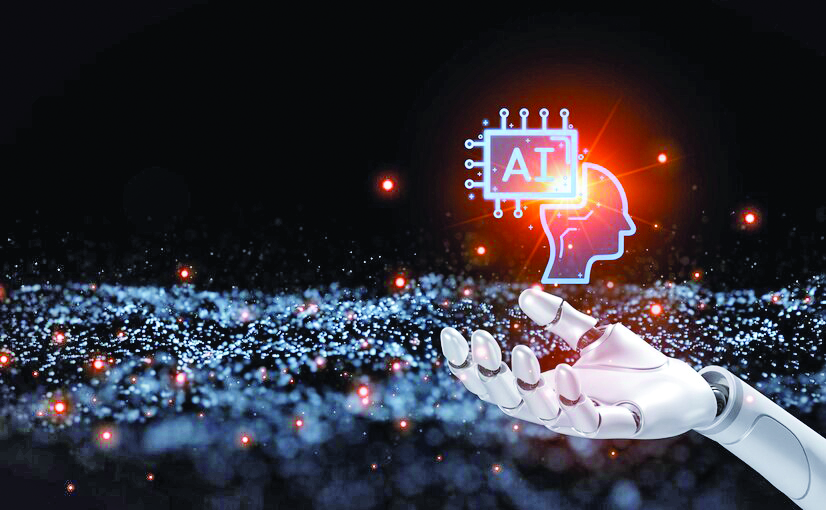AI: Game-changer in marketing
The growth of AI will make a bigger impact on marketing & advertising, bringing more innovation, efficiency, and effectiveness to the sectors

Remember Cadbury’s innovative use of Artificial Intelligence (AI) during Diwali, featuring Shah Rukh Khan. The ad showcased a personalised touch by allowing hyper-local businesses across India to have the superstar as their virtual brand ambassador. This creative approach not only promoted local businesses but also highlighted the versatility of AI in marketing. Nike also used AI for an ad campaign called ‘Never done evolving’ with tennis star Serena Williams, featuring an AI-generated match between her younger and more recent self, celebrating Nike’s 50th anniversary.
The rise of AI has transformed many industries, particularly impacting marketing and advertising. The capacity of AI to collect, analyse, and interpret a huge amount of data offers significant opportunities for marketers globally.
“AI can analyse vast amounts of customer data to understand individual preferences and behaviours, allowing for highly personalised marketing messages, recommendations, and experiences. This can significantly increase engagement, conversion rates, and customer satisfaction,” said Ritesh Saraf, Co-founder and CEO Promilo.
In fact, hyper-personalisation has become especially prominent in e-commerce. AI leverages browsing data to dynamically offer shoppers new and relevant product suggestions each time they visit an online platform. This personalisation extends to personalised shopping experiences, tailoring recommendations to customers’ preferences, interests, and behaviour. Moreover, AI’s influence extends beyond e-commerce, playing a crucial role in providing personalised content and experiences on various social media platforms as well.
This is where the AI-driven chatbots and virtual assistants are transforming customer service and support. Neha Lidder, Founder, Platoon Advisory, believes the chatbots provide instant responses to inquiries, guiding purchasing decisions, and enhancing the overall customer experience. “These intelligent bots not only streamline communication but also gather valuable insights into customer sentiment and preferences,” she said.
Netflix has used AI-driven technology to its full advantage to improve the viewing experience. If you’re into horror shows and have searched for such content, Netflix uses Machine Learning (ML) and AI to recommend personalised content tailored to your preferences. The platform also suggests content based on your past viewing enjoyment. Studies indicate that over 80% of the shows people watch on Netflix are influenced by its personalised recommendations platform.
According to a McKinsey study, marketing, alongside sales, is identified as the business function where AI will have the most significant financial impact. For marketers, this emphasises the transformative potential of AI technology. Utilising AI in Search Engine Optimization (SEO) can bring substantial benefits. By deploying AI solutions, marketers can improve page rankings and develop more effective strategies. AI aids in creating and optimizing content to meet evolving standards. Also, AI marketing tools enable marketers to extract actionable insights in near real-time from the data generated by their campaigns. If you’re a marketer not leveraging AI, you might be missing out on one of the most transformative technologies available.
“Imagine that you are an advertiser who is asked to reduce spends on Google and increase on social media. You are baffled as you have no clue about the user’s real time need for your products. At best, you can target based on their interests, but you do not know if they need your product today or in a week. This is when you turn to AI. This is when you feed in all your customer and product and sales data in AI and find trends. You now know which products sell the most in which location on which day at what time and at what conversion rate, for every single ad source. You also know how many of these are repeat buyers and how many are new ones. You also understand which of these combinations are best for increasing revenue and which ones are best for profits and which ones to reactivate users. You use this data to automate custom attributes in your products feed and further use this intelligence to deliver timely messages to users based on the highest probability of purchase at that time. You create a feedback loop to keep improving this cycle,” said Advit Sahdev, an AI, digital marketing and performance marketing expert.
Saraf believes in using AI for timely messaging, predictive analytics, and targeted lead generation. With tools like ChatGPT and OpenAI, dynamic content creation is enhanced, allowing personalised ad copy, landing pages, or social media posts tailored to specific audience groups. “By leveraging the power of AI in these ways, digital marketers can deliver timely and relevant messaging, generate more targeted leads, and utilise virtual agents to enhance customer interactions and drive business growth,” he said.
Forbes mentioned that Facebook and Google are the top online advertising platforms. They offer tools that blend audience segmentation with predictive analytics for more effective advertising. “AI-powered predictive analytics is empowering marketers to anticipate consumer behaviour with remarkable accuracy. By analysing vast amounts of data, AI algorithms can identify patterns and trends, enabling marketers to make data-driven decisions that optimise campaigns, predict customer needs, and maximize ROI,” said Lidder.
Meanwhile, marketing experts express concerns about ethical considerations and challenges in AI-driven practices. Issues such as data privacy and algorithmic bias pose challenges, urging marketers to navigate these complexities. Ensuring transparency, fairness, and accountability is crucial to maintaining ethical standards in AI-driven marketing strategies.



